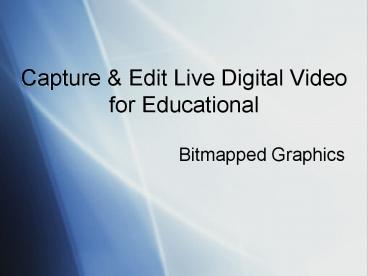Capture PowerPoint PPT Presentation
1 / 27
Title: Capture
1
Capture Edit Live Digital Video for Educational
Bitmapped Graphics
2
Know Your Film Terminology
- http//www.filmsite.org/filmterms12.html
- http//www.imdb.com/Glossary/
3
5 Phases of Film Creation
- 2. Pre-production
- Storyboards
- Breakdown of Requirements
- Locations
- Materials
- People
- Schedule
- Budget
- Props, Costumes, Sets
- 3. Production
- Submit Call Sheets
- Equipment Checkout
- A Good Camera
- An external directional microphone
- Use Effective shooting techniques
- Submit Production Report
4. Post-Production Equipment High-end
Computer The right software Effective editing
skills to tell a story visually. Test
Screening Revisions
- 5. Distribution - delivery and exhibition of your
final product to your audience in a proper and
efficient format - Video? DVD? Interactive CD-ROM? Web?
4
Development Pre-Production
- Inspiration Concept Map (Brainstorming)
- Storyboards
5
Filming Production Phase
6
Phase 3 Production
- A good Camera is Half the Battle
- If you can, avoid the older analog video cameras
Go Digital - Avoid Automatic Settings Use Manual Instead
- Focus Ring
- Zoom Ring
- Aperture, Shutter Speed, Gain Adjust
- Color Balance (Very Important)
- Sound - Never trust the on-camera Microphone
- Always use an external boom mic, or
- Use a clip mic on your talent
7
Phase 3 Production
- Digital Video Cameras (Camcorders)
- Camera takes care of the digital process not as
much of a processing burden to the computer. - Store images on Tape
- A few burn directly to DVD
- Requires Firewire connection so computer can
download the video. - Focus Camcorder Tips on pg. 319
8
Camera Techniques Can Save Your Production
- Always use a tripod!
- Dont zoom while recording.
- Avoid jerky camera movements limit your use of
pan and tilt.
9
Production RulesShooting Techniques
- The rule of thirds
- Depth of Field
- Vertical Angle
- Birds Eye, Normal, Worms Eye
- Telling the story visually
- LS - Long Shot
- MS - Middle Shot
- CU - Close Up
- MS - Middle Shot
- LS - Long Shot
10
The Rule of Thirds
11
The Rule of Thirds Broken
Non-Example Subject is Dead in the Center
12
Depth of Field
- Deep Depth of Field
- Use of a wide-Angle lens
- Smaller Aperture (larger fstop)
- Use in scenes where surroundings are important.
- Shallow Depth of Field
- Use of a telephoto (zoomed-in) lens
- Wider Aperture (smaller fstop)
- Use in scenes of confusion/isolation.
13
Vertical Angle of View
Birds Eye View Depicts Inferiority
Eye-line View Normal
Worms Eye View Depicts Superiority
14
Camera Distance
Long Shot (LS)
Medium Shot (MS)
Close-up (CU)
Extreme Close-up (ECU)
15
Telling a Story Through Camera Distance
16
Phase 4 Post-Production
17
Phase 4 Post-Production
- High-end computer
- Mac G3, G4, or G5
- Pentium 4 or AMD Athlon XP
- Large amount of RAM - no less than 256 MB
- I recommend at least 512MB
- Large storage capacity - no less than 60 GB
- A way to get video into your computer
- Firewire ports
- A digitizing card or box
- iMovie editing software or equivalent
18
The New Digital Setup
19
For Older Analog Cameras/VCRs
- Video Digitizers
- To connect Analog Camcorders and VCRs to a
computer - Converts old analog signal to a digital signal
- As a card in your computer or
- As an external box
20
Video Editing Demo iMovie
21
Editing Techniques
- Always conduct editing in this order
- Arrange clips in a proper sequence
- Apply Visual Effects to desired clips
- Create your Titles - make sure they dont blend
into the background - Apply Transitions - dont get too fancy
- Insert sound effects and background music
- Make Chapter Markings for iDVD
22
Editing Tips
- Remember
- Sometimes a cut is more effective than a
transition - Always keep Timing in mind
- Do the math between shots
- a 1-second transition between two 3-second clips
creates a 5-second sequence. - A cut between two 3-second clips creates a
6-second sequence. - One second can take an eternity
- Try to Match-Action between shots - Avoid
Jump-cuts where action repeats itself
unnaturally. - If using still photos, apply the Ken Burns
Effect - dont zoom in too tight
- Make the motion slow
23
The Quicktime Movie Format
- Why export to Quicktime?
- Place a Movie Clip on a PowerPoint slide
- Place a Movie Clip on a Web Page
- Quicktime is a Library of software CODECs
- For Video
- Sorenson 3, Motion JPEG, MPEG-4 are lossless
(the best) - DV should only be used for full-motion,
full-sized video. - For Sound - IMA 41 and AAC is Lossless
- For MIDI (computerized sheet music)
- Quicktime has built-in instrument voices
- WARNING - Not an actual sound file! DO NOT
import into PowerPoint - IT WONT WORK! - For VR - (QTVR was discussed in previous chapter
lectures)
24
Exporting to Quicktime from iMovie the Easy Way
Source http//ed.stanford.edu/ATS/iMovie_tmp/exp
ortQuicktime.html
25
Exporting to Quicktime from iMovie the Better Way
Choose this instead, then see me for further
instructions or If you can see past the German,
follow the graphics on this web
site http//www.ac-nantes.fr/peda/disc/scphy/doch
tml/general/mecamac/macmeca.htm
26
The Distribution PhaseFileShare
- Homepage
- Videocamera
- VHS Tape
- iDVD
- QuickTime
- CD ROM
- Bluetooth
Course Assignments Saved as MPEG4
27
The End

